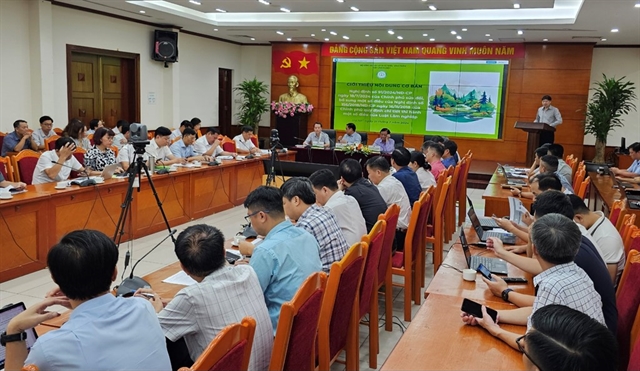 Environment
Environment

 |
| Participants at the conference on the Government’s Decree No. 91/2024/NĐ-CP on enforcing specific provisions of the Forestry Law. — VNA/VNS Photo |
HÀ NỘI — Businesses involved in eco-tourism that use forest environmental services will have to pay fees for these services under the latest decree, which took effect on July 18.
The update was announced on Wednesday during a conference on the Government’s Decree No. 91/2024/NĐ-CP. The decree provides detailed regulations for enforcing specific provisions of the Forestry Law and introduces changes to Decree No. 156/2018/NĐ-CP, issued on November 16, 2018.
The conference was organised by the Ministry of Agriculture and Rural Development.
Trần Quang Bảo, director of the ministry’s Forestry Department, stated that the new decree includes eight new provisions.
These include adjustments to the area of different types of forests, management of ecological, recreational and leisure activities in forests, forest allocation, leasing, withdrawal and decisions on changing forest land use purposes, forest type conversion, policies on changing forest use purposes, infrastructure projects for sustainable protection and development, forest environmental services and transitional regulations.
“The changes are based on the Forestry Law and practical issues to ensure consistency with Vietnamese laws, as well as to address administrative and forest management challenges,” he said.
Regarding the payment for forest environmental services, the decree adds regulations to ensure appropriate adjustments for the area of forests providing these services.
Additionally, the decree updates the list of industrial facilities using water from natural sources to determine specific industries required to pay for forest environmental services according to the Forestry Law.
It also specifies the locations of eco-tourism businesses using these services, requiring them to be either within or adjacent to the forest areas providing environmental services. The people's committees will determine the list of organisations and individuals who must pay for these services.
“For instance, Hà Nội has several eco-tourism and resort areas not within forests but along forest edges or streams. Based on the ministry's guidelines, the city’s Department of Agriculture and Rural Development will issue relevant decisions. This measure will help increase local forest protection fund revenues,” he explained.
At the conference, participants strongly welcomed the new decree hoping it will resolve difficulties in the forestry sector. They also requested that the ministry provide clear guidelines on the delegation of authority for forest land use changes, decisions on changing land use purposes and projects related to forests such as forest type conversion, eco-tourism, environmental services and carbon credit sales.
Đỗ Ngọc Đoàn, deputy director of the Phú Thọ Province’s Department of Agriculture and Rural Development, said that there is still a lack of uniformity regarding forest management authority, particularly for special-use forests.
Additionally, administrative procedures for land allocation, forest allocation, land leasing and forest leasing still have many issues.
In reply, Bảo said that the Department of Forestry and the Forest Protection Department will soon issue detailed guidelines and organise training to help localities implement the decree as quickly as possible.
Nguyễn Quốc Trị, deputy minister of Agriculture and Rural Development, reported that the forestry sector currently covers 15.68 million hectares, with 14.8 million hectares of forest. To manage and exploit these forests, the authorities have issued 65 legal documents in this field.
Trị noted that Decree No. 91/2024/NĐ-CP took effect immediately upon issuance on July 18. He said the decree will soon address existing gaps and discrepancies in forestry regulations, enabling the sector to contribute more effectively to sustainable socio-economic development and environmental protection. — VNS




